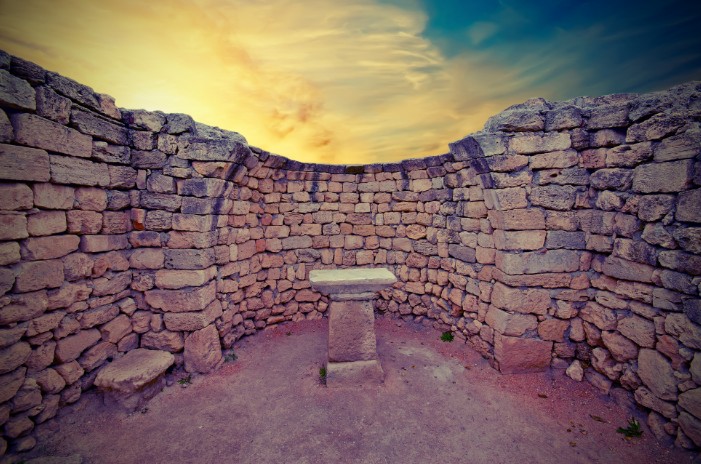Faith
Why Did the Torah Command Animal Sacrifices?
The purpose of sacrifices in Judaism, their difference from pagan rituals, and how prayer now takes their place
- Daniel Blass
- |Updated

“Why did people bring sacrifices in the past? Does God need sacrifices? Doesn’t it sound like idol worship, where people offered animals to false gods?”
“Could you explain the idea of sacrifices in the Temple? Serving God is about prayer, repentance, and devotion of the heart. Why slaughter animals and burn them on the altar?”
* * *
Shalom and blessings,
Judaism teaches that the very first sacrifices were offered not by idol-worshippers but by the earliest humans. The sons of Adam — Kayin and Hevel (Cain and Abel), offered sacrifices, and so did Noach, the ancestor of all humanity. Pagan cultures later borrowed and distorted this practice, forgetting the true Source to whom sacrifices should be directed, and instead offered them to idols.
Today, sacrifices are often misunderstood. People associate them immediately with “primitive rituals” or paganism. But when you think about it practically, sacrifices were not so different from ordinary slaughter for food. Sheep and cattle were eaten anyway by people or by other animals in nature. Most sacrifices in the Temple were actually eaten, but the main difference was the purpose: sacrifice was not just butchering an animal for food, but a sacred act that transformed a physical act into a spiritual encounter.
Judaism is unique among religions in that it doesn’t deny the physical side of life but elevates it. We have bodies, we eat and drink, and the Torah shows us how to sanctify even these basic acts by attaching them to divine purpose. Unlike other traditions that glorified desire and indulgence, or renounced the body entirely, Judaism teaches the middle path: to use the material world wisely, not destructively.
When a Jew eats meat at a sacred meal, says a blessing, and thanks the Creator, that simple act becomes a moment of spiritual elevation. Sacrifices in the Temple worked the same way. They lifted up an ordinary act of slaughtering and cooking meat, into a powerful experience of closeness to God.

What was the purpose of sacrifices?
God does not need sacrifices and they are not “gifts” to Him. As the prophet Samuel said: “Does the Lord delight in burnt offerings and sacrifices as much as in obeying the voice of the Lord? To obey is better than sacrifice” (Shmuel I,15). The prophet Yirmiyahu echoed: “When I brought your forefathers out of Egypt, I did not just command them about burnt offerings and sacrifices, but this I commanded them: obey My voice.”
The prophets were not dismissing sacrifices altogether but were speaking against people who sinned freely and thought that sacrifices would magically cancel their crimes. For them, sacrifices had no value. However the Torah itself commands sacrifices, and the Temple’s main role was to elevate and purify the people through them.
From the very beginning, sacrifices were a way to draw closer to God. The Hebrew word korban comes from karov, “to draw near.” A person offering a sacrifice would feel as if he himself was being offered up for his sins. The experience was raw and transformative: a direct reminder that his life, body, and actions mattered before God. It left a deep emotional mark, like a permanent seal of spiritual responsibility.
Why sacrifices worked
When a person offered a sacrifice with humility, understanding that he needed the sacrifice in order to awaken and return to God, it was a powerful act of both physical and spiritual surrender.
Sacrifices will always be part of the Torah’s vision. Maimonides (Rambam) wrote that while sacrifices may have been given partly as a way to redirect people away from pagan rituals, their true depth is beyond human understanding. He explained that they serve to awaken the soul, symbolizing the casting away of sins and strengthening our resolve not to repeat them.
After the Temple
Since the destruction of the Temple, we no longer have sacrifices. Our daily prayers stand in the place of daily offerings, connecting us to God and providing us with a way to express repentance and gratitude. Still, we long for the restoration of the Temple service, as we say in the Amidah prayer: “Restore the service to Your holy Temple.”
Animals were created to serve humanity’s higher purpose. By transforming ordinary slaughter into a sacred act, sacrifices gave meaning to human life and reminded us that every part of creation can be directed toward God.
The ultimate goal of sacrifices, like other mitzvot, is to bring us closer to the Creator. We achieve this by taking the most physical part of life, and turning it into a bridge toward the Divine.

